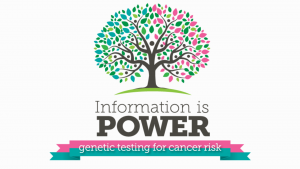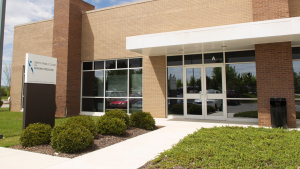
HudsonAlpha Makes Alabama a Healthier Place Through Genetic Testing
By Lillie Mermoud
Knowing your family’s health history can be a powerful tool for looking after your own mental and physical health. Heart disease, diabetes, cancer, and other diseases often run in families.
What if your family has not presented any signs of disease that could be passed on? You may not be aware of a disease running in your family until you or a loved one receives an unexpected diagnosis. That is how the Prout family discovered Lynch syndrome, a genetic predisposition to many types of cancer, runs through their family.
“Genetic testing is the future of medicine,” said Mary Lee Prout. “It allowed my family to make better decisions for our family now and for future generations. Having access to that kind of information is life-changing.”
A surprising diagnosis
Lee was diagnosed with high-grade prostate cancer in the spring of 2021 after a series of prostate-specific antigen (PSA) tests came back with increasingly elevated levels. Lee’s oncologist recognized that such high-grade prostate cancer is typically only seen in patients with a genetic predisposition. Knowing that Lee’s family also has a strong history of cancer, Lee’s oncologist recommended that Lee and his immediate family undergo genetic testing.
 “When the benefit of the information gained from genetic testing was explained to me, I readily agreed to it,” said Lee. “The results have already been of great value to me and our daughters, Katie and Laura. I’ve also contacted my nephews and encouraged them to have the screening performed.”
“When the benefit of the information gained from genetic testing was explained to me, I readily agreed to it,” said Lee. “The results have already been of great value to me and our daughters, Katie and Laura. I’ve also contacted my nephews and encouraged them to have the screening performed.”
Lee, Katie, and Laura learned they had genetic mutations consistent with the genetic condition Lynch syndrome, also known as hereditary nonpolyposis colorectal cancer (HNPCC). Lynch syndrome is caused by inherited mutations in DNA repair genes. When these genes are mutated, the body’s ability to repair damaged DNA is compromised, which can lead to the accumulation of mutations and an increased risk of developing cancer and other genetic disorders.
Knowledge is power
This diagnosis enabled Lee’s oncology team to prescribe treatments that are best adapted for cancers associated with Lynch syndrome. Though the Prouts did not receive genetic testing through HudsonAlpha Institute for Biotechnology, Mary Lee has been an advocate of the Institute’s genetic testing programs. “We have seen immediate benefits of the knowledge we gained from genetic testing,” said Mary Lee. “Our whole family has.”
Laura and Katie have also greatly benefited from this knowledge. Lynch syndrome is primarily associated with colorectal cancer but is also known to cause prostate, endometrial, stomach, liver, kidney, brain, and skin cancer. Because Laura and Katie know they are at a higher risk for many types of cancer, they have been proactive about annual screenings. Laura and Katie’s vigilance has paid off and helped them prevent the onset of disease.
After learning about her diagnosis, Laura knew that her risk of developing cancer was elevated. In addition to regular screening, Laura decided to take prophylactic measures and had a hysterectomy, oophorectomy, and appendectomy, eliminating her risk of developing some of the most common cancers associated with Lynch syndrome. “To my family and I, knowledge is power,” said Laura.” “With the Lynch syndrome diagnosis, health insurance now covers what are potentially life saving screenings and procedures. A cancer prognosis is much better when it’s caught and dealt with early.”
Following a routine scan in the summer of 2021 that is recommended for people with Lynch syndrome, Katie discovered that she had mucous on her appendix, which is an abnormal finding. Shortly after this finding, she had an appendectomy, preventing any possible appendix cancer. Following in Laura’s stead, Katie also plans to take other prophylactic measures.
Improving access to genetic testing
Though genetic testing is well-known in the medical community as a powerful tool for identifying risk factors for disease and diagnosing rare disease, it is rarely covered by insurance and is not widely available. HudsonAlpha is working to tear these barriers down in the Institute’s home state of Alabama.
 Faculty Investigator Sara Cooper, PhD, in collaboration with Kailos Genetics, spearheads Information is Power, a genetic testing initiative that provides residents of Alabama with cancer risk screening for breast, ovarian, colon, pancreatic, and endometrial cancer.
Faculty Investigator Sara Cooper, PhD, in collaboration with Kailos Genetics, spearheads Information is Power, a genetic testing initiative that provides residents of Alabama with cancer risk screening for breast, ovarian, colon, pancreatic, and endometrial cancer.
Initially focusing on north Alabama, the initiative expanded its reach to individuals throughout the state, including communities in Alabama’s Black Belt that tend to have more elevated genetic risk factors for cancer.
Where Information is Power focuses on the genetic risks of cancer, HudsonAlpha’s Smith Family Clinic for Genomic Medicine provides help for individuals who suffer from undiagnosed or misdiagnosed diseases. 
Through genomic testing done at the clinic, HudsonAlpha’s team of genetic counselors are experts at identifying a potential genetic cause for patients’ symptoms. Once a diagnosis is made, the genetic counselors can then work with physicians to adapt treatments to a patient’s new diagnosis. The Smith Family Clinic has successfully diagnosed hundreds of patients, ending their diagnostic journey and providing them with the answers they deserve.
A transformational opportunity
HudsonAlpha is making Alabama a more genomically literate community. Alabama residents can access powerful clinical information that is unique to them and informs their current and future health.
Having a heads-up about the risk for disease allows individuals to be more proactive about getting the appropriate medical screenings, make recommended lifestyle changes, and plan for the future.
“We believe that genomic information can and should inform healthcare everywhere because it allows patients to receive treatment that is personalized to their unique genetic make-up,” said Rick Myers, PhD, HudsonAlpha Faculty Investigator and Chief Science Officer. “Our genetic testing programs are one of the most tangible ways we can do good for our community and make a direct and immediate impact on people’s lives.”

